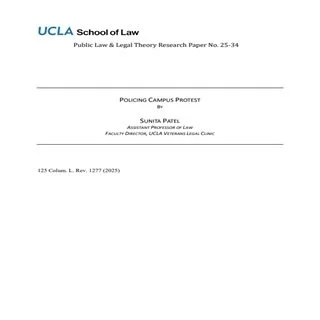College campuses across the country celebrate their legacies of creating free speech guarantees following student protests from the mid-1960s to early 1970s, even though colleges had minimal tolerance of such protests at the time. As part of the New Left’s vision for a different society, students, sometimes joined by faculty, demanded an end to the Vietnam War and war industry research, fought for Black and ethnic studies departments, and protested urban renewal plans that displaced Black working-class communities. We are experiencing another transformative moment. Lawmakers and other stakeholders pressure university administrators to act against students or face funding cuts. Police repression follows, escalating into violence. Universities create or enlarge their own police or security forces in response, while also expanding codes of conduct to quash disruptive protest activity. This Symposium Piece traces the throughlines between university responses in the past and today. This Piece also provides three features of policing campus protests. First, campus police and administrators engage in political surveillance, monitoring the political activity of the campus community, which enables universities to sanction students and faculty through campus codes of conduct and refer them for criminal prosecution. Second, police and administrators network with local and federal law enforcement agencies to share information. Third, police act formally and informally as part of the disciplinary process within universities to sanction and control protests. This Piece ends with contemporary and historic examples of university leaders who have avoided police repression as a response to student dissent and instead chosen negotiation.
Colum. L. Rev. 1277 (2025); UCLA School of Law, Public Law Research Paper No. 25-34


